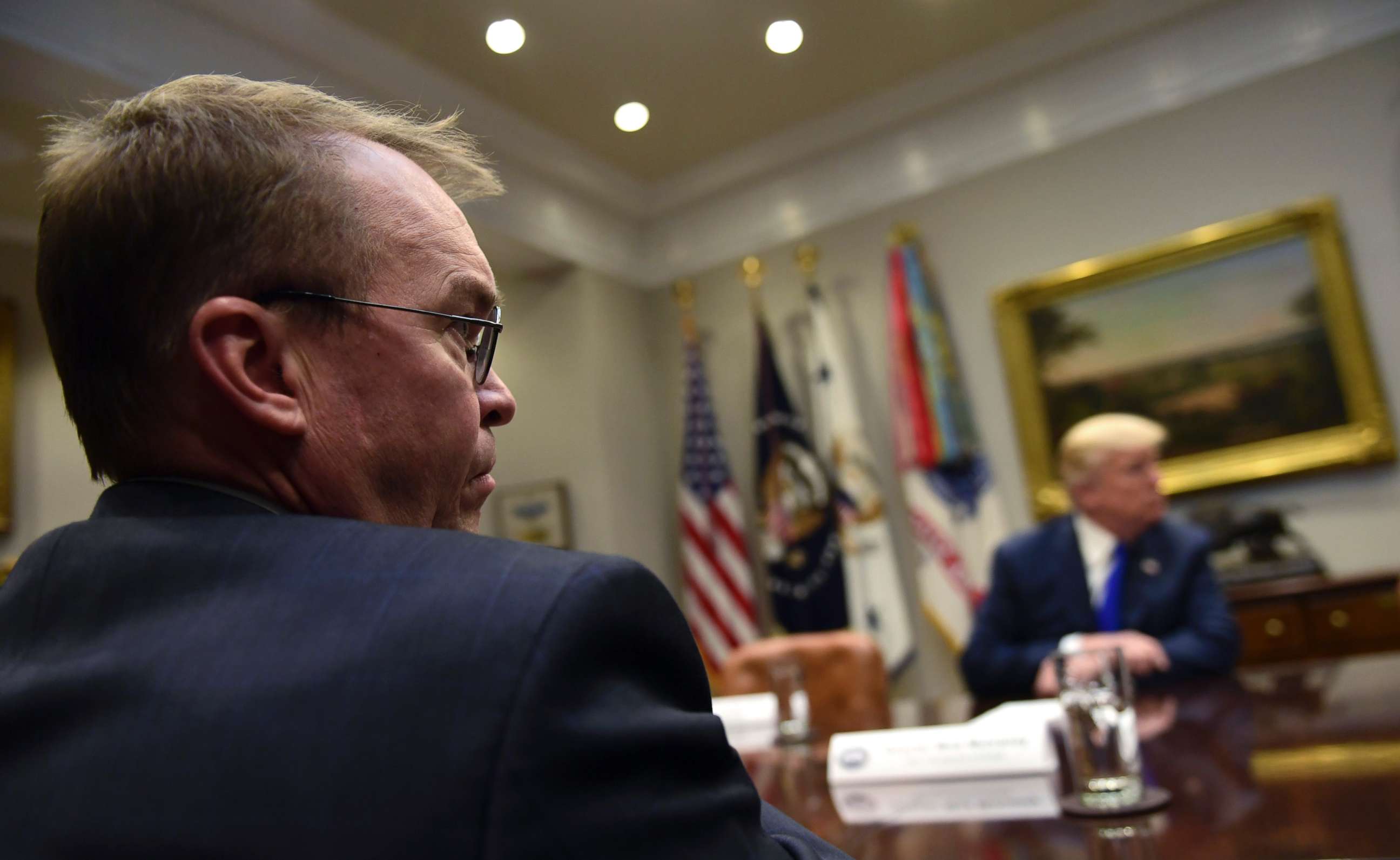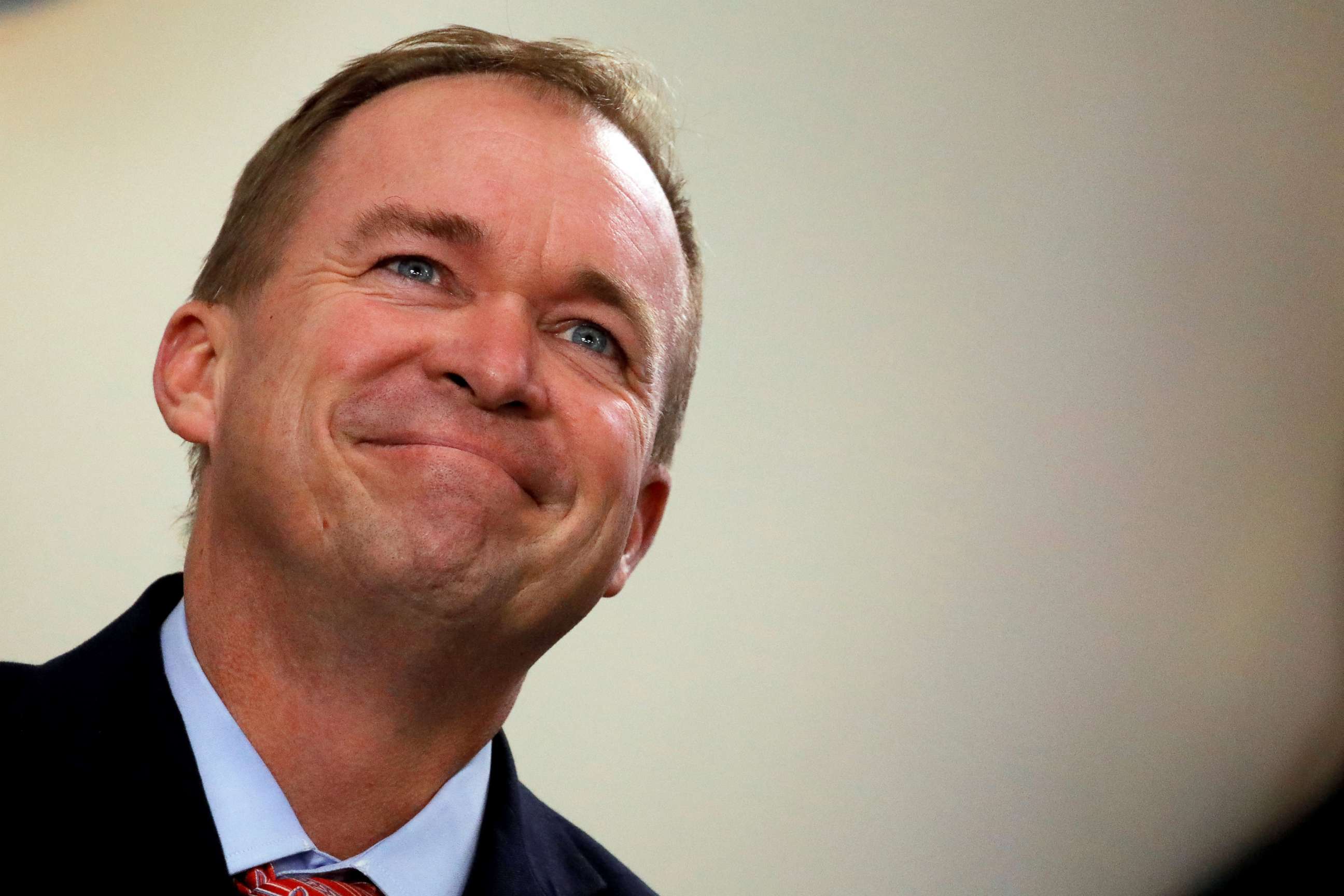Judge's ruling leaves Trump's pick at helm of CFPB
The ruling is a win for the president.
— -- A federal judge on Tuesday ruled in favor of President Donald Trump in the fight over who has the legal right to lead the Consumer Financial Protection Bureau (CFPB).
While the ruling is a win for Trump and his pick to lead the bureau, Mick Mulvaney, it's unlikely to be the final word in the bureaucratic dispute.
Leandra English, who is the current deputy director of the bureau, filed a lawsuit Sunday claiming that she has the authority to serve as the acting director.
U.S. District Court Judge Timothy J. Kelly today denied English’s motion to grant an emergency temporary restraining order, which would have prevented the president from appointing an acting director of the CFPB.
This showdown kicked off last week when long-serving CFPB Director Richard Cordray elevated English to deputy director to allow for the succession prior his departure.

Trump then appointed Director of the Office of Management and Budget (OMB) Mulvaney to lead the consumer protection agency as its acting director.
Mulvaney has been received as acting director at the bureau since Monday, according to multiple accounts.
While issuing his ruling, the judge said that English did not prove a substantial likelihood to win on the merits of the case nor has she met the standard for proving irreparable harm -- both requirements of granting a temporary restraining order.
English’s attorney, Deepak Gupta, had argued that English is required and empowered by the Dodd-Frank Act, which established the consumer bureau, to serve as the acting director.
The government said that another statute -- the Federal Vacancies Reform Act (VRA) of 1998 -- allows the president to temporarily authorize an acting official.
Today, the judge said that “on its face, the VRA does appear to apply to this situation.”
He also said that based on the text of the VRA, not only does it not support the plaintiff’s arguments, but he doesn’t see a conflict with Dodd-Frank.

“Undoubtedly, the CFPB was designed to be independent, but it’s still part of the executive branch,” said the judge.
The judge added that of Mulvaney and English, Mulvaney was the one who had been Senate-confirmed already, albeit for his OMB position, which may favor his side.
“Denying the president the chance to appoint Mulvaney raises significant constitutional questions that haven’t been fully briefed,” the judge added.
While weighing the potential injury to English and others, the judge said that there was “never a time that she was recognized as acting director.”
In court Tuesday, English’s attorney said that a ruling on only the emergency order leaves “everyone in limbo.”
Gupta made it clear they are prepared to appeal this case if necessary, but said that his first step was to talk to his client.
However, he said that in general his options are to appeal, file a motion for a preliminary injunction, which would allow for additional arguments under a somewhat less strict time frame, or request a permanent injunction -- setting up the case to go to the court of appeals.
“What we want is a quick, speedy resolution of this controversy that can get up through the court system and could be appealed because this court -- I think this court understands -- is not the final word on who is the director of the Consumer Financial Protection Bureau,” he told reporters outside the court.
He said he hoped that the attorneys could come to an agreement to move the case along “much quicker” than the Justice Department had proposed.
Gupta shared more background on English’s day-to-day since this has unfolded, saying that on Monday, she went to the bureau, had meetings and performed bureau duties. Mulvaney claimed Monday that she did not show up to work and that the absence could be grounds for terminating her.
Gupta said it was his understanding that English was in the bureau all day Tuesday conducting bureau business. He added that he was “concerned that there might be personnel action taken” based on emails she received today from Mulvaney “reprimanding” her for the way she has acted.
Employees have been told to report any contact from English to the CFBP general counsel, Gupta said.
Department of Justice attorney Brett Shumate, who is representing the president and Mulvaney, said that the restraining order motion has nothing to do with English’s employment status.
Her employment status is “not before the court at all,” he said.
He went on to say that Mulvaney has been received as the acting director -- receiving briefings and appearing on the CFPB’s organization chart online.
“We are pleased with the court’s decision to deny the request for a temporary restraining order, finding that the plaintiff had not shown a substantial likelihood of success on the merits,” said DOJ spokesperson Lauren Ehrsam in a statement after the ruling.
ABC News' Avery Miller, Janet Weinstein and Devin Dwyer contributed to this story.




